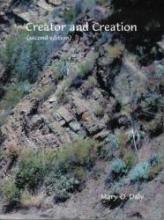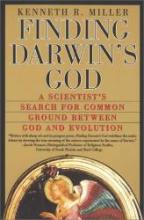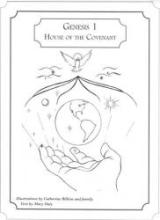Making Sense of Creation vs. Evolution
Creator and Creation (third edition)
Nihil Obstat, Imprimatur
Finding Darwin's God
This book sat on our bookshelf for quite a while, unread. Honestly, I found the title offputting, especially given Charles Darwin's known rejection of God in his own life. Eventually, my husband read it, and encouraged me to do the same. Dr. Miller says that he was perturbed by what he saw as some Christians' distrust of science, displayed specifically in their rejection of evolutionary theories in favor of creationism or intelligent design. This is a particular concern of Miller, who is himself a Catholic and co-author of the popular "Miller and Levine" high-school biology text. This concern spurred him to write this book defending not only the biological theory of evolution but also the idea that science and religion can be compatible. In the introduction, Miller considers the background and the present situation with regard to these issues both in academia and in the culture at large. I appreciated his honest appraisal of the degree to which "the presumption of atheism or agnosticism is universal in academic life ... how common this presumption of godlessness is." (p. 19) In the following chapter, he explores scientific methods, assumptions, and establishing evidence -- specifically considering areas in which direct experimentation and observation are impossible -- using the analogy of detective work. Following this, he very clearly lays out the case for evolution. He also notes the two distinct ways in which the word "evolution" is used: the first means the natural history of life on earth, characterized by change in time, leading gradually to modern species, while the second refers to the mechanism by which this occurred. Thus, he says, "Evolution is both a fact and a theory." It's important to keep both these meanings in mind. In the next three chapters, Miller successively takes on three well-known ideologies opposed to biological evolution, exploring the religious and scientific flaws of each. First, he takes on young-earth creationism. In a series of arguments from the physical sciences, he lays out a concise and compelling argument for an ancient earth. I was especially impressed with the table of radioactive nuclides and its implications. Then comes the section that explains the chapter's title, "God the Charlatan." Here, Miller provides quotes from a staple of creationist literature (Genesis Flood by Whitcomb and Morris) to the effect that God created a young universe with an "appearance of age." In other words, it's all a hoax. The logical implications of this claim both for science and religion are nothing short of intolerable. In Creator & Creation, Mary Daly draws the same conclusion. Next, he takes on critics such as Philip Johnson, who argue that "micro"-evolution is possible, but not "macro"-evolution. This form of Intelligent Design (ID) argues that evolution can produce minor changes within species, but not new species themselves. Logically, therefore, as Miller observes, God (or the Designer) would have to have created each individual species, including thousands of failed, dead-end species. Further, similar species would have to have been placed geographically and temporally close together and in the right sequences, giving the distinct impression of relatedness where, according to this version of ID, none exists. I appreciated the scientific data that Miller provides in this chapter, as well as his analysis of Eldredge & Gould's "punctuated equilibrium" theory. However, I felt that he equivocated on the term "species" and failed to give a solid definition for it. On p 108, he writes "among bacteria, which is to say among most of the cells alive n the planet, it is particularly easy to see that the differences between species are indeed nothing more than the sum total of differences between their genes." This may indeed be true for bacteria, but among higher species chromosomal differences play a vital role, and no amount of mere gene-level mutations would change chromosomes. I would like to have seen at least some discussion of this. The third criticism of evolution he addresses is the form of ID made popular by biochemist Michael Behe in his book Darwin's Black Box: the claim that certain structures within the cell are "irreducibly complex" and therefore could not have evolved but rather had to be designed. Miller acknowledges that the argument from design is not only the oldest, but the "best rhetorical weapon against evolution." Nevertheless, he argues, it comes up short. As a cell biologist himself, Miller points out that some of Behe's contentions are factually incorrect. For example, although the "9+2" flagellar structure that Behe discusses is the most common, many fully functional flagella and cilia exist that are missing many parts of the supposedly "irreducibly complex" 9+2 structure. He also offers some excellent commentary on the clotting cascade. However, I thought Miller was excessively concerned about the negative impact of ID on research, saying for example, "If you believed Michael Behe's assertion that biochemical machines were irreducibly complex, you might never have bothered to check; and this is the real scientific danger of his ideas." To me this seems highly unlikely, since the nature of science is to test ideas -- even accepted ones. Indeed, Miller himself explains earlier in this book that biologists constantly test evolution knowing that the one who can prove it false will earn instant fame. I do not see why this would not apply equally to ID, were it to ever achieve the level of scientific acceptance that evolution has done. In the next few chapters, Miller discusses the "gods of disbelief" that underpin atheistic materialism, and how these assumptions are contradicted by science itself. He addresses the question of God and evolution. Or, if evolution and other scientific theories explain everything, where does God fit in? His elucidation of the implications of the shift from 19th-century scientific determinism to the 20th century's quantum mechanics is enlightening. In essence, quantum effects mean that science cannot, even in principle, deal in certainties. It can never achieve complete knowledge. Quantum indeterminacy breaks the chain of knowledge and causality and thus, Miller says, it also breaks absolute materialism. He then argues that science and religion are not really contradictory, but complementary. He also provides a fascinating analysis of how the concept of evolution is used (inaccurately) by scientists and intellectuals in support of a worldview hostile to God and religion; this worldview, rather than science itself drives many of the underlying concerns of creationists. The author then looks at some of the findings of cosmology, concentrating on the "anthropic coincidences" of our universe. He argues persuasively that the "traditional explanation" for these -- i.e. God -- is every bit as reasonable as any materialist alternative. Indeed, he suggests, the materialists must be getting a little desperate because they are postulating multiple universes. In this chapter, he also explores the role of chance in life, and what that says (or doesn't say) about God. In the final chapter, Miller ties it all together. I loved the part in which he questions the curious inequity whereby scientific theories can be extrapolated "legitimately" to materialism, atheism, and a non-existence of morality, but never in the opposite direction. Or, as Miller has it: "Apparently it is fine to take a long, hard look at the world and assume scientific authority to say that life has no meaning, but I suspect I would be accused of anti-scientific heresy if I were to do the converse, and claim that on the basis of science I had detected a purpose to existence." (p. 269) He's right on. It is refreshing to see a scientist who not only notices the problem but articulates the double standard so clearly.
Although Miller displays a sound understanding of the scientific facts and their implications, his philosophy and theology seem much weaker. Specifically, I believe he is wrong on the following points:
- He writes, "Given evolution's ability to adapt, to innovate, to test, and to experiment, sooner or later it would have given the Creator exactly what He was looking for -- a creature who, like us, could know Him and love Him, could perceive the heavens and dream of the stars, a creature who would eventually discover the extraordinary process of evolution that filled His earth with so much life." (p. 238-9) It seems to me that he is saying that mind and will -- the abilities to know and love God -- are products of the evolutionary process. But aren't they really powers of the soul, and therefore not evolved in any sense?
- Miller also writes that, "No God [sic] could have created individuals who were free to sin but never chose to do so." (p. 253, emphasis in original) He writes this as part of a paragraph making the point that we are the source of sin, not God. This is an excellent, valid point, but it could easily have been made without the additional (and unwarranted) claim that God could not have made us both free and capable of not sinning. In addition to the exceptional case of Mary, we know that God created angels with free will; some of them chose to sin, while others did not. In fact, Miller's statement is actually self-contradictory, as Dr Rioux explained to me.
- He recounts the tale of Fr. Murphy, who spoke to his First Communion class, saying that, "Flowers, just like you, are the work of God." Years later, at a scientific conference during which a presentation explained how plants make flowers, Miller says, "The real message was, 'Father Murphy, you were wrong.' God doesn't make a flower. The floral induction genes do." (pp. 261-2) I found this particularly jarring given the general thrust of the book that evolution is a means that God created to achieve His purposes. The reality is that God makes flowers by the agency of the floral induction genes. Fr. Murphy was right after all.
- I also thought he weaseled on his belief in God when he wrote (at the end of the book) that he believes in "Darwin's God." This may have been intended as merely a clever retort, but I would have been far more impressed if he had confessed belief in the God of Abraham, Isaac, and Jacob. Or better yet, tied the two together.
Finally, although Miller manages to be commendably charitable through most of his book, I was disappointed with his treatment of a quote from Behe's book to the effect that the "intelligent designer" might be a time traveler (p 162). The quote makes Behe appear to be a bit of a flake, but Miller fails to inform his readers that in this section of his book Behe is exploring ways in which a philosophical naturalist might avoid the implication of a Divine Designer, and toward the end says that: "Most people, like me, will find these scenarios entirely unsatisfactory." (Darwin's Black Box, p 249) Similarly, Miller quotes as Behe's definitive position a passage which is actually preceded in the original work by the words: "Perhaps a speculative scenario will illustrate the point." (ibid, p 227) Nevertheless, I recommend this book to Christians who are interested in getting all the facts in the debate surrounding evolution, creationism, and intelligent design.
Genesis 1: House of the Covenant
8.75x12" heavy paper, suitable for pencils, markers, or crayons
Nihil Obstat



